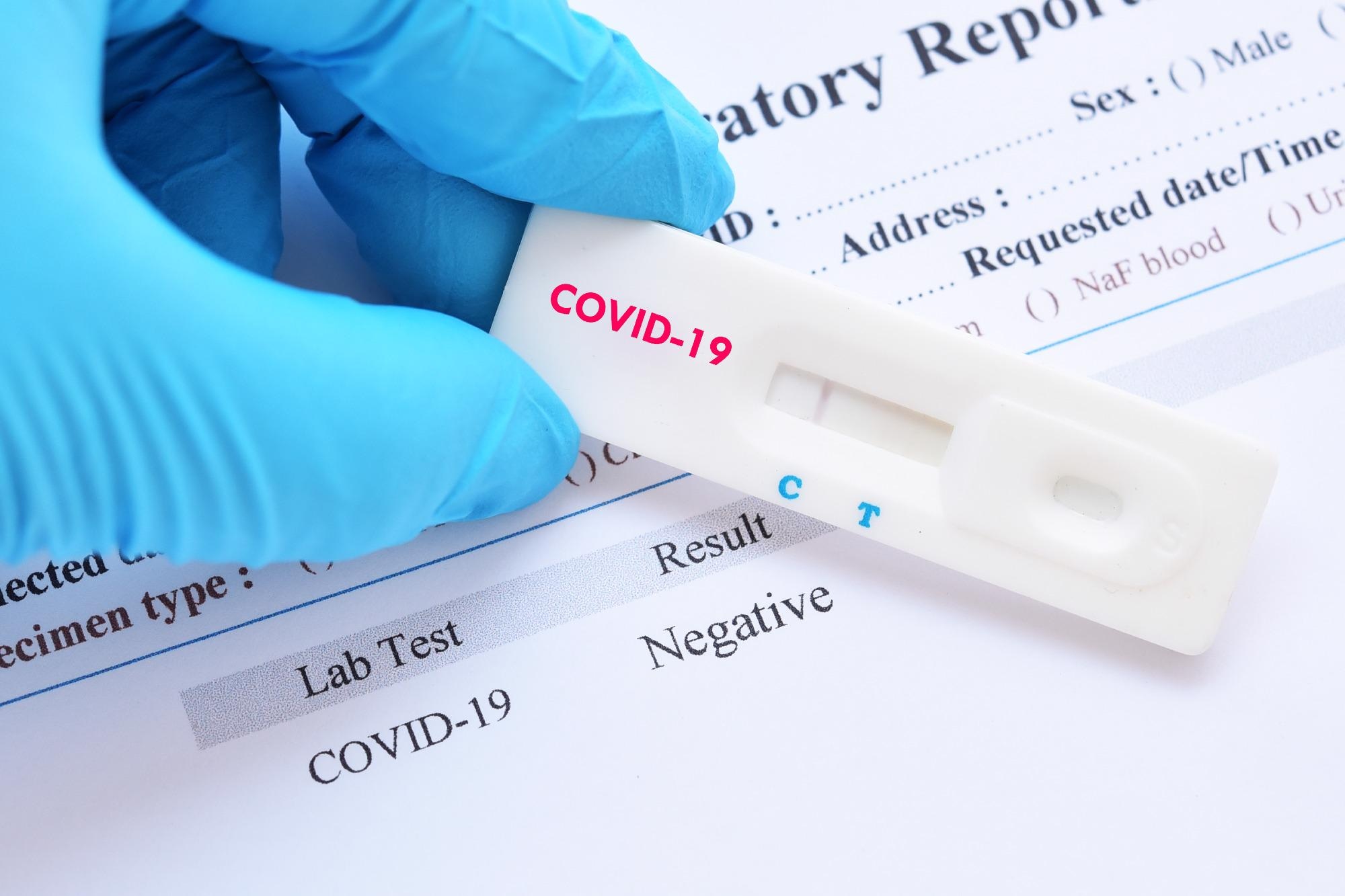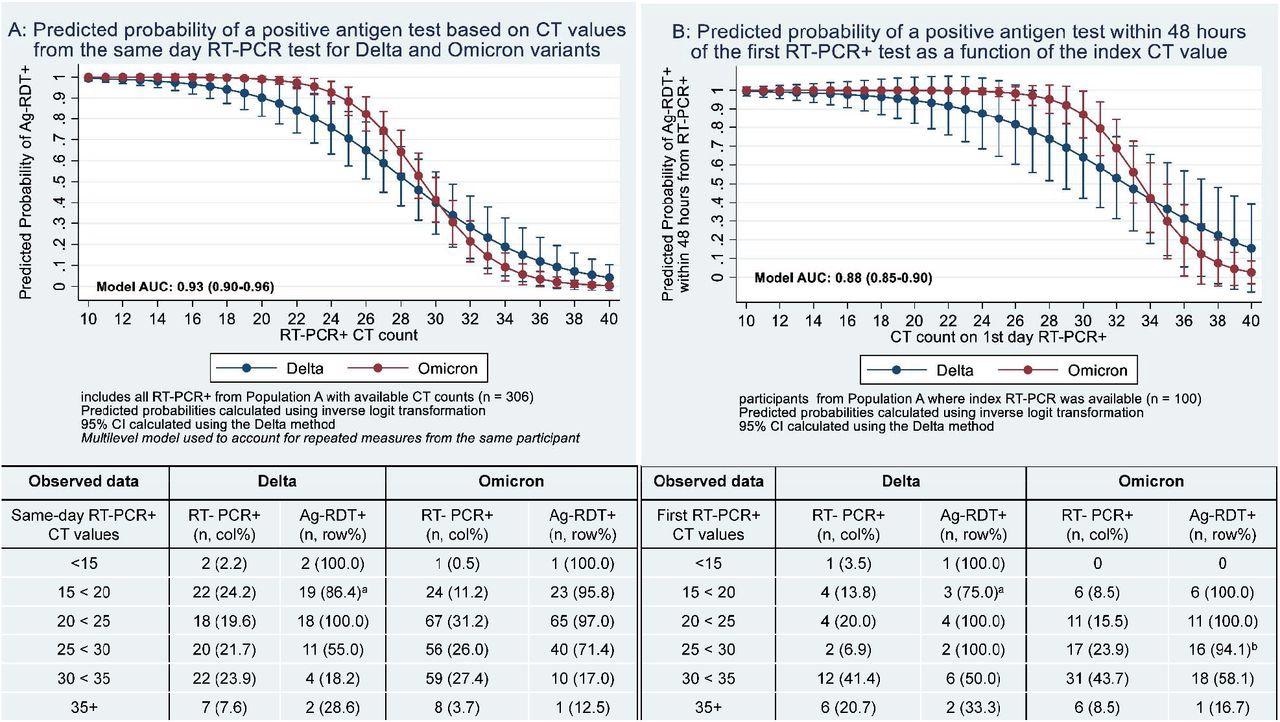A recent study by US researchers shows how the performance of rapid antigen tests to diagnose severe acute respiratory syndrome coronavirus 2 (SARS-CoV-2) is not inferior among individuals infected with the Omicron variant compared to the Delta variant. The study is currently available on the medRxiv* preprint server while it undergoes peer review.
 Study: Comparison of Rapid Antigen Tests’ Performance between Delta (B.1.61.7; AY.X) and Omicron (B.1.1.529; BA1) Variants of SARS-CoV-2: Secondary Analysis from a Serial Home Self-Testing Study. Image Credit: Jarun Ontakrai / Shutterstock
Study: Comparison of Rapid Antigen Tests’ Performance between Delta (B.1.61.7; AY.X) and Omicron (B.1.1.529; BA1) Variants of SARS-CoV-2: Secondary Analysis from a Serial Home Self-Testing Study. Image Credit: Jarun Ontakrai / Shutterstock
Since the start of the coronavirus disease 2019 (COVID-19) pandemic, the accessibility to accurate testing was shown to be a pivotal tool for the timely identification of the infection – not only to break the transmission chain and inform isolation recommendations but also to facilitate early treatment.
We know that rapid antigen tests come with a lower sensitivity when compared to a polymerase chain reaction (PCR) test for the detection of SARS-CoV-2; however, they are an easy-to-use and cost-effective testing modality, and serial testing can improve their sensitivity.
This is especially pertinent in the context of the rapid emergence and global dominance of the SARS-CoV-2 Omicron variant, laden with manifold mutations in the genes that can lead to conformational changes in the viral parts important for rapid test detection.
And of course, this underscores the significance of understanding the performance of rapid antigen tests in the real-world setting since early reports showed it might be less effective in detecting the Omicron variant when compared to the other ones.
A research group led by Dr. Apurv Soni from the University of Massachusetts Chan Medical School aimed to compare the performance of rapid antigen tests (for both Delta and Omicron variants) with the gold standard of nasal PCR test results when testing participants serially every 48 hours.
Comparing test performance
In short, this paper offered a unique look at longitudinal PCR and rapid antigen tests in a large prospective cohort, which enabled capturing data not only at the onset of infection, but also during the infection throughout the emergence of the Omicron variant.
This was a non-prespecified analysis in which the authors aimed to determine whether the performance of rapid antigen tests differed in participants with Delta variant when compared to the Omicron. Asymptomatic study participants were enrolled from October 2021 to January 2022, with both rapid antigen and molecular testing performed every 48 hours for fifteen days.
The base for comparing the performance between the variants was test sensitivity, defined as the proportion of participants with positive rapid antigen test results related to their first positive test result obtained with PCR for different testing durations.

Probability of Antigen Test Positivity of Delta and Omicron Variants as a Function of CT Values Among RT-PCR Positive Participants
Detecting both Omicron and Delta SARS-CoV-2 variants
The researchers have found that the performance of rapid antigen tests was not inferior for the detection of the Omicron variant in comparison to the Delta variant. On the contrary, they have unveiled a higher proportion of participants with Omicron variant and a positive test results in comparison to participants with Delta variant on the same day and within 48 hours of positive PCR test.
However, it is important to note that overall same-day positivity for rapid antigen test on the onset of positive PCR test was low at 23.5%, but repeated testing within 48 hours improved this proportion to the overall percentage of 54.9%.
It also has to be emphasized that almost half (45.1%) of the participants with a positive PCR test result had had a false negative result on a rapid antigen test, irrespective of the variant implicated in the infectious process. This was observed even when two antigen tests were performed within 48 hours of the first PCR positivity
The value of serial testing
Considering these findings, we can see that the behavior of rapid antigen tests in detecting SARS-CoV-2 infections is similar for Delta and Omicron variants, with an overall low detection rate on the same day as an initial positive PCR test result, and a higher detection rate when a second test is used 48 hours after the first one.
“Our data suggest that the performance of rapid antigen tests remains stable during the Omicron period as compared to the Delta period, and that serial testing continues to be important to raise the performance of rapid antigen tests,” highlight study authors in this medRxiv paper.
Naturally, additional work will be needed to improve our understanding of individuals with only PCR positive test results and appraise the public health significance of a false negative rapid antigen test in this subpopulation.
*Important notice
medRxiv publishes preliminary scientific reports that are not peer-reviewed and, therefore, should not be regarded as conclusive, guide clinical practice/health-related behavior, or treated as established information.
- Soni, A. et al. (2022). Comparison of Rapid Antigen Tests’ Performance between Delta (B.1.61.7; AY.X) and Omicron (B.1.1.529; BA1) Variants of SARS-CoV-2: Secondary Analysis from a Serial Home Self-Testing Study. medRxiv. https://doi.org/10.1101/2022.02.27.22271090, https://www.medrxiv.org/content/10.1101/2022.02.27.22271090v2
Posted in: Device / Technology News | Medical Research News | Disease/Infection News
Tags: Antigen, Coronavirus, Coronavirus Disease COVID-19, covid-19, CT, Genes, Medical School, Omicron, Pandemic, Polymerase, Polymerase Chain Reaction, Public Health, Research, Respiratory, SARS, SARS-CoV-2, Severe Acute Respiratory, Severe Acute Respiratory Syndrome, Syndrome

Written by
Dr. Tomislav Meštrović
Dr. Tomislav Meštrović is a medical doctor (MD) with a Ph.D. in biomedical and health sciences, specialist in the field of clinical microbiology, and an Assistant Professor at Croatia's youngest university – University North. In addition to his interest in clinical, research and lecturing activities, his immense passion for medical writing and scientific communication goes back to his student days. He enjoys contributing back to the community. In his spare time, Tomislav is a movie buff and an avid traveler.
Source: Read Full Article



